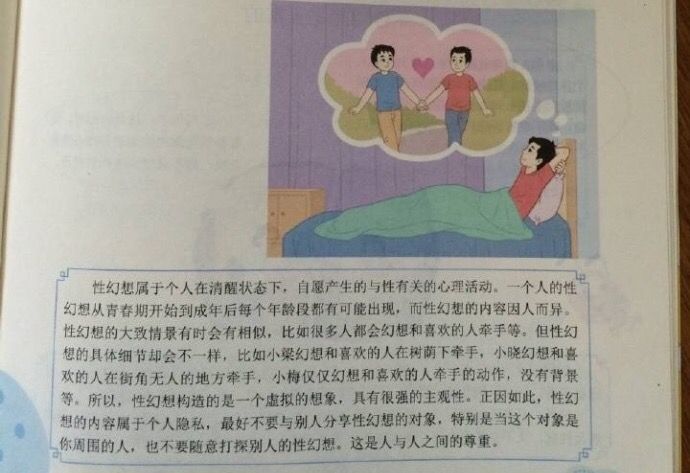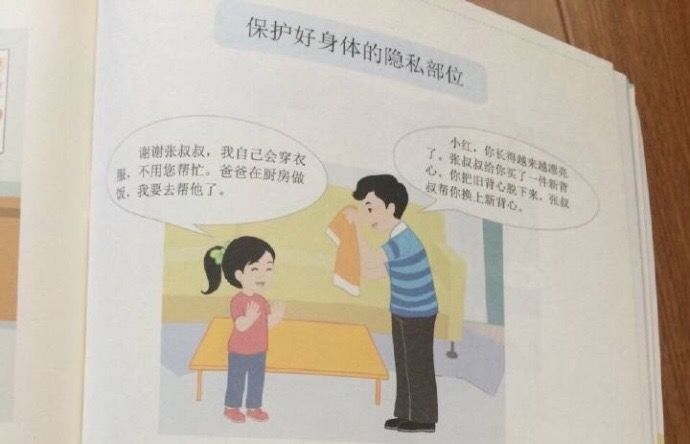Earlier this year, a young woman in China came forward with her story about how her stepfather repeatedly raped her for four years. Writing under the pseudonym Xingxing, she said her stepfather began these horrific crimes when she was fourteen. She didn’t understand what was happening to her until she wound up injured in the hospital because of his actions. After examining her, the nurse told her that she may have been sexually assaulted.
Xingxing’s story is an embodiment of China’s current sex education. Data shows that one in ten people in China have experienced some form of sexual assault before adulthood. 70 to 90% of these crimes were committed by people they knew. Children in China are not protected enough against sexual violence–they are unaware of when and how they need to protect themselves.
In 2017, a publishing company in Beijing released a book on sex education for elementary school children. It was considered a bold first attempt at comprehensive sex education. And the book does not stop at biological information about sexual maturity and how babies are made: alongside a cartoon of a boy and a girl holding hands, there are also cartoons of boys holding hands with boys, and girls with girls. The book tells them that love comes in many different ways, all of which are equally welcome. The book also educates children on consent and how to protect themselves against sexual assault.
 (an illustration showing a boy having a sexual fantasy about another boy)
(an illustration showing a boy having a sexual fantasy about another boy)
When the book first hit elementary school classrooms, it caused a big controversy. Several voices on the internet praised the book for being free, bold and avant-garde in a rather conservative sexual climate. But more people criticized it. Many parents reacted quite strongly against it. responding:
“Is it really appropriate to put something so vulgar and dirty in a textbook for young children?”
“This book is just going to make them curious, mislead them, and encourage sexual activities.”
Sadly, the book did not survive these accusations. It was removed from classrooms and taken off the market.
For most people in China, sex education equals no education. Society takes an abstinence approach towards sex. Many think the way to keep children safe is to keep them in the dark and pretend sex does not exist. Sex itself is considered extremely private and taboo, and so there is silence on the subject. If you talk about sex, especially with elders, they may think you are uneducated or shameless. Many young people find that their parents refuse to engage in a detailed conversation about sex, even for educational purposes.
Studies show that the average age people in China begin having sex is 17. Young people are not having sex later in China than elsewhere. People there are curious and participating in sex before they reach their twenties too. But proper sex education, if there is any, lags far behind. And inadequate sex education does more harm than good. The founders of Yummy, a WeChat sex education and advice platform, said “so many of the girls were going in for abortions without having any idea what was going to happen.” They also added that “many women have abortions because they lack basic sex education, especially contraceptive education.” As it turns out, abortion was the primary form of birth control for many young woman in China.
Sex education is not indecent or vulgar. It is not meant to encourage premature sex. It is simply there to equip people with knowledge to protect themselves and be healthy. A “comprehensive sex education,” defined by the United Nations Population Fund, “includes scientifically accurate information about human development, anatomy, and reproductive health, as well as information about contraception, childbirth and sexually transmitted infections.” But more importantly, it goes beyond that. It also provides information on non-physical topics, and teaches us how to view sex in a healthy, positive light.
So more than knowledge, comprehensive sex education also breeds healthy values about sexual relationships. This helps us break negative, anarchic stereotypes towards sex and gender. Negative stereotypes can perpetuate faulty information. They can also make it harder to tackle problems like gender inequality, discrimination, and sexual abuse, and to understand important concepts like sexual consent .
 (this cartoon teaches children to be alert and protect themselves even with people they know)
(this cartoon teaches children to be alert and protect themselves even with people they know)
Xingxing’s case shows how a lack of sex education made it extremely easy for her stepfather to hurt her. Many offenders take advantage of the fact that children don’t understand what sex, sexual consent, or sexual assault is. Young children don’t even know what hit them.
Refusing to talk about sex also perpetuates the idea that it is vulgar, shameful and taboo. This closes up all productive conversations and makes proper sex education even harder to receive. Young adults who are considering sex for the first time find it hard to ask for advice from their parents. Many people also never reveal to their parents that they have already engaged in sexual activities.
It is also one of the reasons why people who have experienced sexual assault find it so hard to recover. Because of how society views sex, many find it hard to open up to even their parents and close friends. Their lack of understanding of consent makes many victims misunderstood and even blamed when they do decide to tell someone. Many are too ashamed to seek personal help, much less legal or public help. They are left completely alone in their experiences.
Of course, we shouldn’t be completely hopeless. There are more and more discussions about opening up classrooms to proper sex education. Many teachers say they do want to educate their students on these topics, even if they are met with opposition. There are also organizations working hard to initiate conversations about sex and sexuality. And in terms of #MeToo, there have been some brave individuals who have chosen not to remain silent. Young girls are taking their cases to court, even if their sex offenders are powerful people. It’s good news, but most of these actions are only ocurring in developed regions like Beijing or Shanghai.
Sex and sexual orientation can be private, but that does not make them shameful. We do not live in a sexless heterosexual society, so we should stop pretending we do. It’s still a long road, but we can hope.



0 Comments